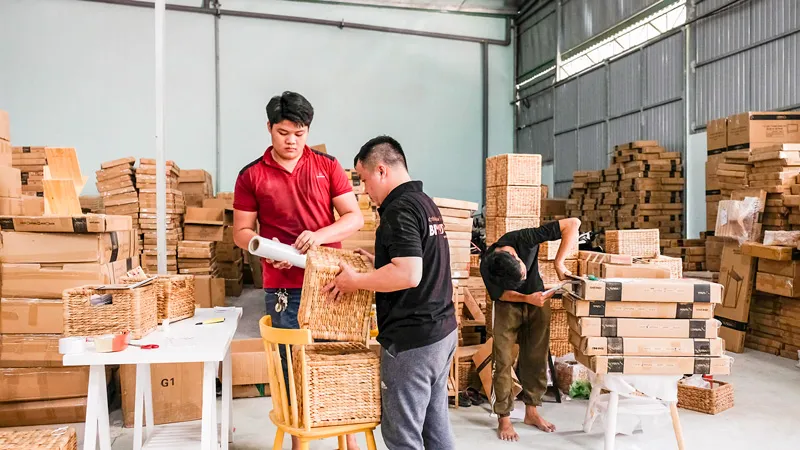
Success stories
Ever since the outbreak of the Covid-19 pandemic and its continuing spread across nations worldwide, many companies that were once functioning only offline have successfully turned to now functioning remotely online. One example of a successful switch to online selling has been the interior furniture company BEYOURs. Earlier, BEYOURs sold and functioned in the traditional style through shops and showrooms, and the owner had never paid much attention to e-commerce.
However, when BEYOURs was forced to shut down its showrooms due to the Covid-19 pandemic, sales at BEYOURs suffered and the company had to innovate quickly and switch to operating its business online. This move was such a success that by April BEYOURs sales touched VND 2 bn. Another successful example has been the silk brand Tan My Design. This well-known hand-embroidered silk product manufacturer was unable to receive customers in its shop outlets and for the first time in 51 years, the owner had to switch to selling items online.
Digital Transformation (DT) is not just moving from offline to online, but can be applied across most areas to bring out the maximum output from business activities. For instance, the logistics sector is the backbone of the supply chain, and now some logistic companies have moved to adopt DT in their service sector using new electronic devices in providing a range of services.
Saigon Newport Corporation now uses an ePort app and an electronic delivery order app, eDO, for all its services. Its ePort app provides its customers the facility to make online payments via an ATM or corporate account. It can also issue electronic billing and carry out electronic delivery transactions with shippers. This ePort app has been very successful and both customers and shippers save much travel time in taking orders, and better manage documents digitally. All this process has reduced rush hour traffic congestion and pollution and also stress on employees.
Some setbacks
However, not all companies have been successful in their Digital Transformation move. Mr. Nguyễn Tương, Deputy General Secretary of Vietnam Logistics Business Association (VLA), said that about 40% of apps currently being used by logistic companies are just basic apps for international delivery, warehousing, transportation, electronic data exchange and customs declaration. Logistic businesses still face three major difficulties, such as in human resources, finance and suitable technology choice.
DT requires huge investment in logistic solutions, ranging from VND 200 mn to tens of billion dong. However, more than 80% of VLA members and about 97% of logistic companies are SMEs, which means DT is out of reach for them. International standard software programs have not met the needs in Vietnam, making it hard to choose a suitable technology option for each company. Another hindrance is the companies trust in technology. They still fear confidentiality, safety and payment security.
According to a survey by Vietnam Software and IT Services Association (VINASA), 15% of companies are adopting DT. Almost 99% of SMEs have financial difficulty, so they generally consider DT as technology only for the bigger players. The retail sector has more motivation to change from offline to online, but it still lacks in online skills in sales and marketing and has limited knowledge of technology.
Training programs
In mid-September, the Business Studies and Assistance Center (BSA) signed a partnership agreement with Digital Transformation for SMEs (DTS) for a Go Online program to provide companies with skills and knowhow to move onto the web. In this program, BSA and DTS will organize free training courses to help company employees to access the net and make DT plans workable, speedily and easily.
The Ho Chi Minh City Union of Business Association (HUBA) has also introduced a DT program aimed at providing consultancy and assistance to SMEs. The association has a fund of VND 4 bn, and via its programs it is expected to provide 300 companies with free use of its DT apps X-Starter and X-SME for six months, and then for the following six months at a 20% discount. This assistance is now available for eight groups of businesses which include start-ups, trading companies, logistic companies, medical and healthcare companies, real estate companies, retail companies, and travel and accommodation companies.
In June 2018, Google introduced its Vietnam Digital 4.0 program. The project is supported by the Ministry of Industry and Trade, in partnership with Vietnam Women's Union, the Vietnam Chamber of Commerce and Industry in Ho Chi Minh City, and some other partners. The program provides free training for digital and software technology. The program is meant for SMEs, super small businesses and individual startups to update their digital knowhow, improve their business management abilities, and increase their online business performance.
In August 2019, the Ministry of Industry and Trade and Google decided to expand this program even further. Google now offers free online marketing solutions such as ‘Google My Business’, which is a free app that allows any business to advertise their products on Google.




















